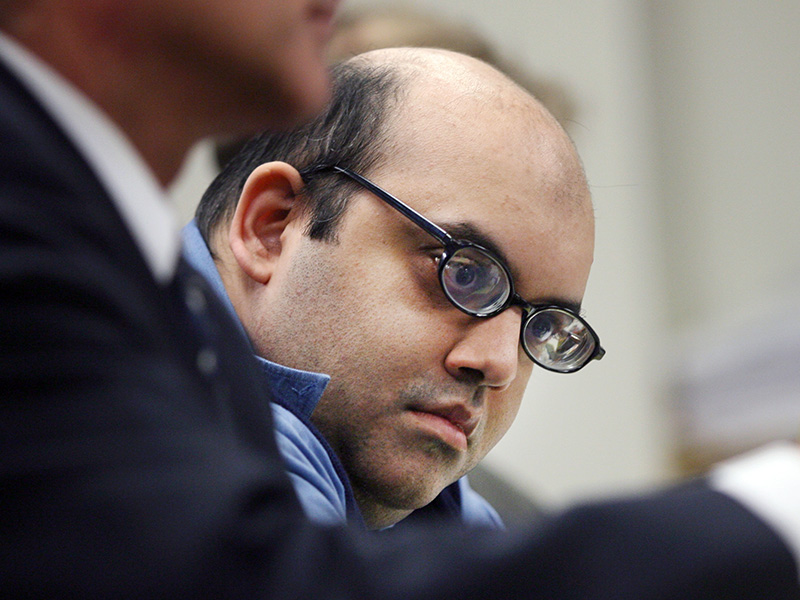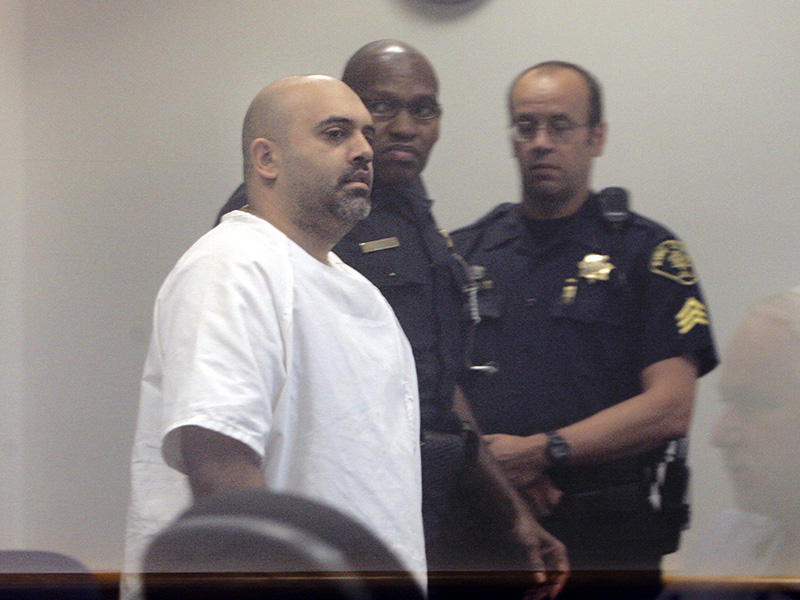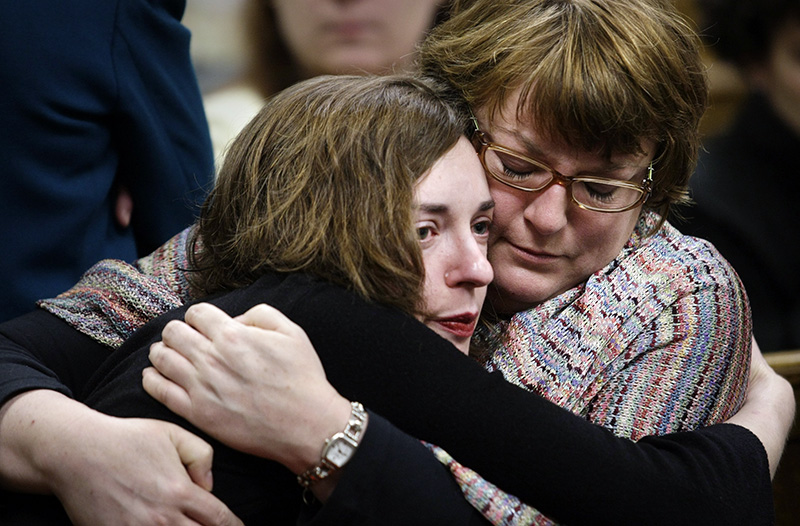
Naveed Haq listens during closing arguments of his trial by King County deputy prosecutor Don Raz at the King County Courthouse in Seattle on May 22, 2008. (AP Photo/Dan DeLong, Pool)
AIRWAY HEIGHTS, Wash. (RNS) — Naveed Haq remembers July 28, 2006, well, even if he doesn’t want to.
He packed two handguns, ammunition and a combat knife into a laptop case and drove to McDonald’s for what he thought would be his last meal: Hotcakes, a cheese McMuffin and a Coke.
Then, filled with fury, Haq began his three-and-a-half-hour drive to Seattle from central Washington to open fire on the Jewish Federation of Greater Seattle, where later that day he shot six women, leaving one dead and five seriously injured, including one who was 17 weeks pregnant.
He was convicted of murder, attempted murder and a hate crime. Now 11 years into his imprisonment, Haq is the new imam for the Airway Heights Correctional Main Facility in Airway Heights, Wash. In his new role, he’s trying to lead by example in conveying remorse to those he hurt.
[ad number=“1”]
“I have to make some right out of my terrible wrongs,” Haq said via email after an in-person visit from Religion News Service. “I have deep regrets for killing and maiming innocent people. I will spend the rest of my life trying to rectify my misdeed as much as possible.”
Despite a no-contact order that prevents Haq from contacting his victims, he wrote eight “accountability letters” to his victims last year. Over 37 pages, he apologized to individual victims and to the Jewish Federation of Greater Seattle. Victims can be notified when an inmate leaves a letter, according to the prison system’s victim services program. None of Haq’s victims have asked to be notified, however, and none have asked to read the letters he’s submitted.
“To really make amends I have to be innovative,” he said. “For me, it is the right thing to do.”
Shooting victim Cheryl Stumbo declined to comment. Others either could not be located or did not respond. The Jewish Federation of Greater Seattle did not respond to RNS queries.
Forgiveness might not be forthcoming. Rabbi Joshua Stanton, founding co-editor of the Journal of Interreligious Studies and rabbi at East End Temple in Manhattan, said when it comes to forgiveness, Judaism focuses on actions rather than words.

Shooting victim Dayna Klein breaks down while testifying in the King County Courthouse at the trial of Naveed Haq on April 21, 2008, in Seattle. Klein was 17 weeks pregnant when Haq walked into the Jewish Federation office in July 2006 and opened fire. (AP Photo/Ken Lambert, Pool)
“The burden is on Mr. Haq to demonstrate a genuine and profound change of being through his deeds in an ongoing way,” Stanton said. “Even when a perpetrator genuinely does change, the burden is not placed on victims or their families to forgive.”
Haq told his story recently in a two-hour interview with RNS while prison guards stood watch and other inmates visited nearby with parents, girlfriends and children. What he recalled was a troubled man’s journey into hate-filled terrorism.
When Haq opened fire on the Jewish Federation in 2006, it was at the height of the Lebanon War. He had grown up feeling isolated, he said, as his family was one of the few Muslim families in the Tri-Cities area of Kennewick, Pasco and Richland. He said he only understood Jews in the context of a cultural rivalry.
“I didn’t understand that Jews were people too,” he said.
[ad number=“2”]
Perusing the internet one day, he learned that the Jewish Federation of Greater Seattle had sponsored a Walk for Israel.
“I thought, ‘Women and children are being killed by the Israeli military in Lebanon and Palestine and this group is sponsoring a ‘Walk for Israel,’” he said.
Haq was eager to kill, he said. And with mounting debt, a failed marriage, a collapsing career and severe mental health issues, he was also eager to die.
“I had completely failed at society,” he said. “I had given society my best shot.”
On his way to Seattle that day, he pulled over and hiked down an embankment to practice shooting the .40- and .45-caliber handguns he had loaded the night before. Then he reloaded his weapons and continued his journey, praying for forgiveness as he drove.

This photo of surveillance footage recorded by security cameras at the Jewish Federation of Greater Seattle on July 28, 2006, shows Naveed Haq entering the building. The footage was offered as evidence in the trial against Haq at the King County Courthouse in Seattle on April 17, 2008. Haq killed one woman and wounding five during the shooting. (AP Photo/Andy Rogers, Pool)
When he got there, the doors to the Jewish Federation were locked. He hit the buzzer, ducked out of sight from the surveillance camera and with his .40 Ruger in hand, and waited. Within minutes, a 13-year-old girl walked to the buzzer. Haq pointed the gun at her.
“This is a holdup,” he said. “Let me in.” She obeyed. Haq made her lead him up the stairs to the federation’s newspaper office. He asked to see the manager, then began shooting. After the rampage and trial, he was sentenced to life in prison without the possibility of parole, plus 120 years.
L. Gregory Jones, professor of theology and Christian ministry at Duke Divinity School, said it’s common in most religions for someone to eventually become motivated to seek forgiveness and acknowledge their wrongdoings.
“After enough time, the pangs of the conscience begin to work on someone to repent,” he explained. “Most commonly they seek forgiveness from those wronged and from their relatives. It’s understandable that he (Haq) would seek it. I think the yearning for reconciliation is a natural human desire.”
Haq said he wasn’t truly ready to seek forgiveness until now because he had to “unlearn the hate” he had in his heart.

Naveed Haq, center, enters the courtroom as people watch from behind the courtroom glass at King County Superior Court, on Aug. 10, 2006, in Seattle. (AP Pool/Mike Siegel, Pool)
He became the facility’s imam in April when his fellow Muslim inmates agreed he was the most qualified. Among his peers, he had the most Arabic memorized, showed good character and demonstrated remorse for his crimes.
“I have interacted with Jewish prisoners and I learned about their community,” he said. “I now understand that my thinking was deeply flawed. I no longer feel the desperation and hopelessness that I felt, which led to my crime. I am no longer the same ignorant man I was 11 years ago.”
[ad number=“3”]
He spent the first six years behind bars sleeping his life away, he said, before a prison psychiatrist adjusted his medication and diagnosed him with schizoaffective disorder, bipolar type. Since then Haq has earned 35 prison educational certificates as well as a paralegal certificate.
“After wasting so many years, I became a man in a hurry,” he said.
However, Jones said Haq’s victims may not be ready to forgive. He noted the passage from C.S. Lewis’ “Letters to Malcolm: Chiefly on Prayer,” which reads, “Last week while at prayer, I suddenly discovered — or felt as if I did — that I had really forgiven someone I had been trying to forgive for over 30 years.”
“It took 30 years for someone as good of a person as C.S Lewis to forgive,” Jones said. “There’s a timefulness that people need to reach that … but there shouldn’t be pressure put on the victim to do it on anybody’s timetable other than their own.”
However, Jones noted, if someone isn’t working toward forgiveness, the anger they hold can “corrode their own soul.”

Cheryl Stumbo, right, a victim of the shootings at the Jewish Federation of Greater Seattle, and Rachel Hynes, left, comfort one another during the testimony of shooting victim Christina Rexroad at the Naveed Haq trial on April 17, 2008. (AP Photo/Andy Rogers, Pool)
Haq is trying to make amends by writing to his friends and family about forgiveness, the beauty of other religions, and gun control. He’s been delivering similar sermons to the prison’s Muslim community and speaking at its Toastmasters club.
“I am thankful I still have much to offer the world,” Haq said. “Even voices among the lowest among us can change people’s hearts and minds.”
Haq knows he has a long road ahead of him and that he may never be forgiven for what he did, but he said he won’t stop trying.
“In all my studies of mental health, self-improvement and religion, I can now say with certainty that hate is the worst mental illness,” Haq said. “I had to lose my freedom to learn this.”




